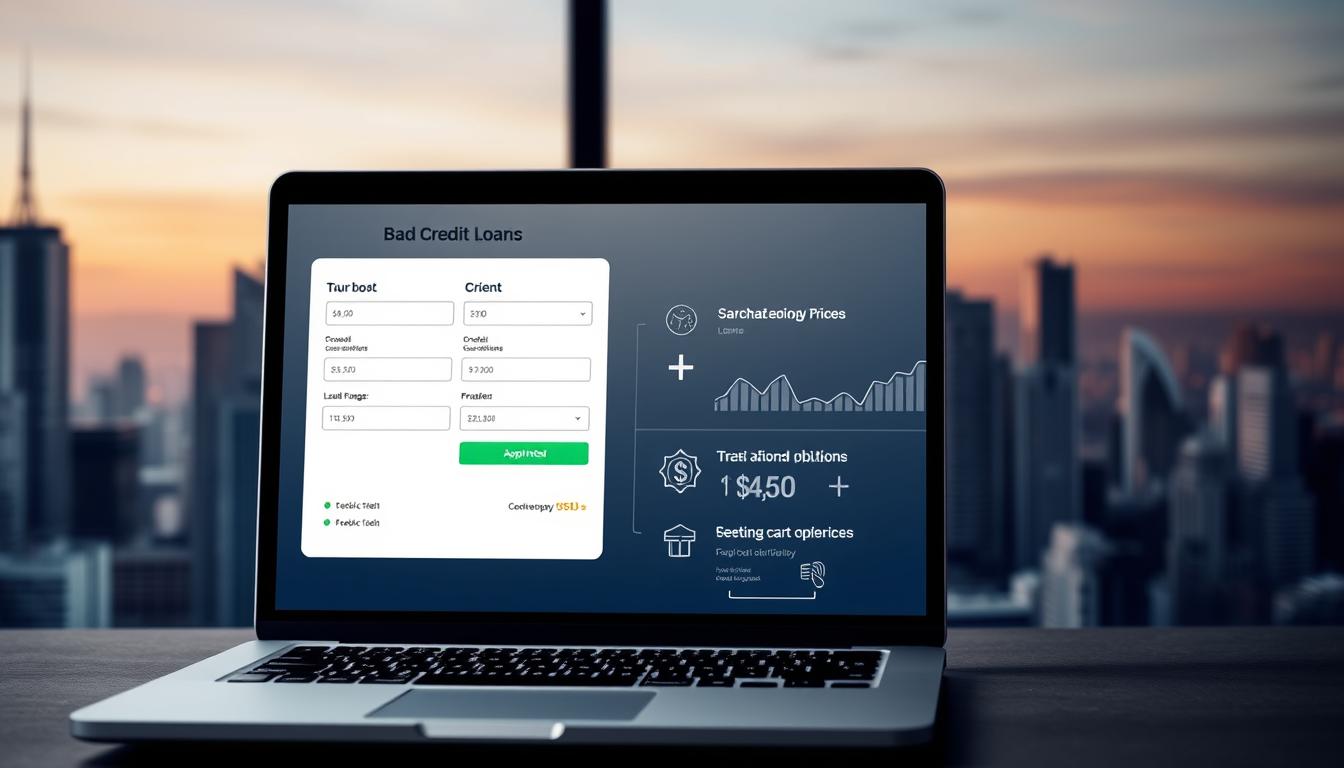Consolidation Loans: Simplify Debt & Improve Finances
Did you know that millions of Americans struggle with multiple debts? They deal with different due dates and interest rates. This can be really tough and make it hard to get your finances in order.
Managing many debts can feel overwhelming. Debt consolidation loans are a good way to fix this. They combine all your debts into one loan with a lower interest rate. Plus, you only have to make one monthly payment. This can simplify your financial obligations and help you save money on interest.
By making your debt easier to handle, you can also improve your financial health. This can help reduce stress about money. We’ll look into how consolidation loans work and their benefits in this article.
Key Takeaways
- Consolidation loans can simplify multiple debts into one loan.
- Lower interest rates can be achieved through debt consolidation.
- A single monthly payment can make financial management easier.
- Consolidation loans can potentially save you money on interest.
- Improving financial health is a key benefit of debt consolidation.
What Are Consolidation Loans?
Debt consolidation loans help manage many debts with one loan. They combine different debts into one with a fixed interest rate and repayment term. This makes it easier to handle your finances.
Definition and Purpose
A debt consolidation loan is a personal loan for combining debts. It can include credit card balances, personal loans, and more. The main goal is to make paying off debt simpler by reducing monthly payments and possibly lowering interest rates.
By merging debts, managing your finances becomes easier. Instead of juggling many due dates and rates, you focus on one loan. This loan has a fixed interest rate and a single monthly payment.
Types of Consolidation Loans
There are various consolidation loans for different needs. Here are some common ones:
- Personal Loans for Debt Consolidation: These are unsecured loans for combining debts. They have a fixed interest rate and repayment term, helping with financial planning.
- Balance Transfer Credit Cards: Not a loan, but credit cards for moving credit card debt to one card. They often have a 0% introductory APR.
- Home Equity Loans: These loans use your home’s equity to consolidate debts. They might have lower interest rates but require your home as collateral.
Each consolidation loan has its benefits and things to consider. Personal loans are good for those not wanting to use their home as collateral. Balance transfer credit cards are best for those with good credit scores to save on interest.
When looking at a consolidation loan, check the terms carefully. Look at the interest rate, repayment period, and any fees. Make sure it fits your financial goals.
How Do Consolidation Loans Work?
Getting a consolidation loan involves several steps. First, you need to understand your financial situation. Then, find the right loan for you.
Application Process
To apply for a consolidation loan, follow these steps:
- Check your credit score, as it affects your interest rate.
- Gather financial documents like income proof and debt lists.
- Research and compare lenders to find the best option for you.
- Submit your application online or in-person, as required by the lender.
Many lenders offer online consolidation loan applications. This makes it easy to apply from home. You can quickly see your loan options without hurting your credit. Most get a credit decision the same day.
Getting Approved
Approval for a consolidation loan depends on several factors. Your credit score, income, and debt-to-income ratio matter. Lenders check if you can repay the loan.
For more details on debt consolidation loans, visit NerdWallet’s guide.
Here are key things lenders consider:
- Credit history: A good score helps a lot.
- Income stability: Lenders like stable income.
- Debt-to-income ratio: This shows if you can handle more debt.
Understanding these factors and preparing well can boost your approval chances. This simplifies your financial life.
Benefits of Consolidation Loans
For those feeling overwhelmed by multiple debts, consolidation loans offer hope. They can simplify your finances by merging several high-interest debts into one. This results in a single, predictable payment each month.
Simplified Payments
Handling multiple debts can be tough. Consolidation loans make it easier by combining them into one monthly payment. This reduces the stress of keeping track of due dates and amounts.
Key advantages of simplified payments include:
- Easier financial management
- Reduced likelihood of missed payments
- Less stress related to multiple debt obligations
Potential Lower Interest Rates
One big benefit of consolidation loans is the chance to get a lower interest rate. If you have debts with high interest, like credit card balances, a lower rate can save you money.
For example, if you consolidate debt with a loan at a lower rate, you could save hundreds or thousands of dollars in interest. This is over the loan’s life.
Improved Credit Score
Consolidating debt can also boost your credit score. By making payments simpler and possibly lowering interest rates, you’re more likely to pay on time. This is key for your credit score.
To maximize the positive impact on your credit score:
- Make all your loan payments on time
- Keep your credit utilization ratio low
- Monitor your credit report for any errors or inaccuracies
Risks of Consolidation Loans
Consolidation loans can be helpful but also risky. They make payments easier and might lower interest rates. But, there are big risks to know about.
Accumulating More Debt
One big risk of consolidation loans is getting more debt. Consolidating debts can feel like a relief with lower payments or rates. But, if you’re not careful, you might use the extra credit to get into more debt.
For example, if you combine your credit card debt, you might want to use your cards again. This can lead to new debt. It’s key to control your spending and not use credit too much after consolidating.
Impact on Credit Score
Consolidation loans can also hurt your credit score. Applying for one means lenders check your credit, which can lower your score.
Also, missing payments on your consolidation loan can harm your score. It’s important to pay on time and check your credit report often to keep it accurate.
Knowing these debt consolidation risks helps you make better financial choices. It’s about being smart and careful with your money.
Who Should Consider Consolidation Loans?
Consolidation loans aren’t for everyone, but they can change lives for the right people. They’re a smart choice if you have many debts with high interest rates. If you can get a loan with a lower rate, it’s worth considering.
Ideal Candidates
People with many high-interest debts can really benefit from consolidation loans. If you’re paying a lot in interest on several debts, combining them into one loan can save you money. It also makes paying back easier.
For example, if you have credit card debt, personal loans, or other high-interest debts, consolidating them can lower your monthly payments. It also cuts down on the total interest you pay over time.
- Those with a stable income can manage a consolidation loan well.
- Individuals who have a plan to avoid new debt after consolidation.
Financial Situations to Avoid
While consolidation loans can help, they’re not for everyone. Avoid consolidation loans if you’re not tackling the real debt issues. It might just lead to more debt.
If you tend to overspend or haven’t changed your spending ways, consolidating debt might not solve your problems. It’s important to look at your spending habits before getting a consolidation loan.
“Consolidating debt without a plan to manage spending can lead to a cycle of debt that’s hard to escape.”
Exploring Different Types of Consolidation Loans
Managing debt is easier when you know about consolidation loans. These loans can make your finances simpler. But, picking the right one depends on your financial situation and goals.
There are mainly two ways to consolidate debt. You can get a 0% interest balance transfer credit card or a fixed-rate debt consolidation loan. Each option has its benefits and fits different financial needs.

Personal Loans for Consolidation
Personal loans are a common choice for debt consolidation. They let you combine multiple debts into one loan with a fixed interest rate. This means you only have one monthly payment to make.
Having a good credit score can help you get better interest rates on personal loans. But, those with poor credit might face higher rates or stricter terms.
Home Equity Loans
Home equity loans let homeowners borrow against their property’s equity. These loans often have lower interest rates than other consolidation options. But, there’s a big risk: if you can’t repay the loan, you could lose your home.
It’s crucial to think about the pros and cons. Home equity loans can simplify your debt and lower your monthly payments. But, the risk of losing your home is a serious concern.
Balance Transfer Credit Cards
Balance transfer credit cards are another option for consolidating debt, best for those with good credit. They let you move multiple credit card balances to one card, often with a 0% introductory APR. This can help you avoid extra interest, if you pay off the balance before the promo ends.
Key benefits include easier payments and possible savings on interest. But, watch out for balance transfer fees and the chance of higher interest rates after the promo ends.
How to Choose the Right Loan
Finding the right consolidation loan takes careful thought. There are many lenders with different terms. It’s important to know what to look for.
Comparing Lenders
When comparing lenders, look at a few key things. First, check the interest rates. A lower rate means less money paid over time. Also, consider the repayment terms, like how long the loan lasts and if payments can be adjusted.
Look for customer relationship discounts. For example, Wells Fargo offers a discount for certain customers. This can save you money.
Understanding Fees and Rates
It’s crucial to know the fees of a consolidation loan. Look out for origination fees, late fees, and penalties for paying off early. These can increase the loan’s cost. For more info, check Bankrate’s guide.
Financial expert Jeanette Garretty advises, “Understanding your loan terms and making timely payments is key to getting out of debt.”
“Debt consolidation is not a magic solution; it’s a tool that requires careful management to be effective.”
Reviewing Terms and Conditions
Before agreeing to a loan, read the terms and conditions carefully. Know the total loan cost, monthly payments, and any early repayment penalties. Being comfortable with these terms helps avoid surprises later.
- Check for any hidden fees.
- Understand the repayment schedule.
- Know the lender’s policies on prepayment.
Tips for Successfully Managing Consolidation Loans
Managing a consolidation loan is more than just paying on time. It’s about having a solid plan and staying disciplined with your finances.
Creating a Repayment Plan
To manage a consolidation loan well, you need a personalized repayment plan. First, look at your finances and decide on a monthly payment that feels right. You can pick a loan term from 12 to 84 months and borrow between $3,000 and $100,000.
Here’s what to think about when making a plan:
- Figure out how much you can pay each month based on your income and expenses.
- Pick a loan term that makes your monthly payments manageable and keeps interest costs down.
- Set up automatic payments to make sure you never miss a payment.
Staying Within Budget
It’s key to keep your spending in check with a consolidation loan. This means watching your expenses, not taking on new debt, and adjusting your budget as needed to meet your repayment goals.
Here are some ways to stay on budget:
| Strategy | Description | Benefit |
|---|---|---|
| Track Expenses | Keep an eye on your spending to find ways to cut back. | Allows you to put more money towards your loan. |
| Avoid New Debt | Don’t get new credit card debt or take out other loans. | Keeps you from adding more debt. |
| Adjust Budget as Needed | Check your budget often and tweak it to stay on track. | Helps you meet your loan repayment goals. |

By sticking to these tips and staying disciplined with your money, you can handle your consolidation loan and reach your financial targets.
Alternatives to Consolidation Loans
Consolidation loans are just one way to handle debt. Let’s look at other options that might work for you. It’s important to explore all your choices to find the best fit for your finances.
Debt Management Plans
A debt management plan is a way to manage your debt with help from a credit counseling agency. These plans help you pay off debts over time, often with lower interest rates and fees. One of the key benefits of a debt management plan is that it doesn’t require a good credit score to qualify, making it accessible to more people.
These plans can make your payments easier and might reduce what you owe. But, it’s important to know that joining a plan can affect your credit score. Also, picking a trustworthy credit counseling agency is crucial to avoid scams.
Bankruptcy Considerations
For some, bankruptcy might be a serious option for dealing with too much debt. Bankruptcy can wipe out some debts, giving you a fresh start. But, it has big long-term effects on your credit report. It’s essential to consider bankruptcy only after exploring other alternatives, because of its severe impact on your financial future.
| Option | Credit Score Impact | Debt Simplification | Long-term Consequences |
|---|---|---|---|
| Consolidation Loan | May initially decrease, then improve | Yes | Potential for higher interest rates if not managed well |
| Debt Management Plan | May be reported on credit reports | Yes | Less severe than bankruptcy, but still impactful |
| Bankruptcy | Severe negative impact | No | Long-lasting credit and financial implications |
By looking at these alternatives and their effects, you can make a better choice for your finances.
Real-Life Success Stories
Many people have found success with consolidation loans. They’ve used these loans to simplify their debt and improve their finances. These stories inspire and offer insights into the benefits and challenges of consolidation loans.
Individuals Who Benefited
Many have used consolidation loans to better manage their debt. For example, one person said their loan helped them save a lot of money and stay on a healthy spending path. They noted, “The debt consolidation loan the Prosper approved me for allows me to save a lot of money and stay on track with good, healthy spending.”
“The debt consolidation loan the Prosper approved me for allows me to save a lot of money and stay on track with good, healthy spending.”
These stories show how consolidation loans can change lives. By combining debts into one loan with a lower rate, people can manage their finances better and feel less stressed.
Lessons Learned
Success stories teach important lessons. First, it’s key to carefully review the terms and conditions of any consolidation loan. This ensures it fits your financial goals. Second, having a solid repayment plan is crucial to avoid getting back into debt.
Here are the main takeaways from those who’ve benefited from consolidation loans:
| Benefit | Description | Outcome |
|---|---|---|
| Simplified Payments | Consolidating multiple debts into one loan | Reduced financial stress |
| Lower Interest Rates | Securing a lower interest rate than existing debts | Significant savings over time |
| Improved Credit Score | Making timely payments on the consolidation loan | Enhanced creditworthiness |
By looking at these success stories and lessons, those thinking about consolidation loans can understand its potential. It can help them reach their financial goals.
Resources for Further Assistance
Managing debt well means having the right tools and advice. Look into different consolidation loans to find what works best for you.
Expert Guidance
Financial counseling services offer personalized advice. They help you create a plan to simplify your debt. This is crucial for handling complex financial situations.
Utilizing Online Tools
Online tools, like our Debt Consolidation Calculator, show how a fixed interest rate can lower your monthly payments. These tools help you make smart financial choices and plan your debt repayment better.
Using these resources, you can manage your finances better. This leads to a more stable financial future.









